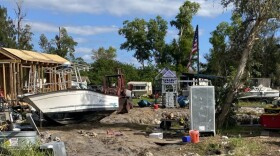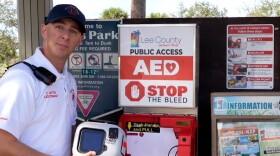SCOTT SIMON, HOST:
Cowpokes coming in from the open range to party in town is as well-known as BJ Leiderman, who writes our theme music. Christmas was traditionally a time of great cowboy migration. Towns across the country held cowboy Christmas balls under various names, and they still are.
Jim Kent takes us to the Black Hills Cowboy Christmas Concert and Dance in Lead, S.D. for a taste of the holidays, cowboy style.
(SOUNDBITE OF ARCHIVED RECORDING)
UNIDENTIFIED SINGER: (Singing) Tall in the saddle, he spends Christmas day, driving the cattle over snow-covered plains.
JIM KENT, BYLINE: The image of cowboys herding cattle in all kinds of weather and at all times of the year is fairly accurate. But even cowpokes got time off now and again, including at Christmas. The first Cowboy Christmas Ball dates back to 1885 in Texas and spread across the West. The tradition waned after World War One, was revived after Prohibition, and came back in vogue with Michael Martin Murphey's 1991 album "Cowboy Christmas."
PAUL LARSON: And Michael, he kind of started what I'd call the Cowboy Christmas craze. But there's so many now that it's just a - it's an ongoing phenomena, if you would.
KENT: Paul Larson is the organizer and a performer in the Black Hills Cowboy Christmas Concert, now in its 10th year.
(SOUNDBITE OF ARCHIVED RECORDING)
LARSON: (Singing) Sing sweet and low your lullaby until angels say Amen.
KENT: Larson's also a working cowboy who does carpentry on the side to help keep his lifestyle alive. He says his first show, called A Cowboy Christmas Ball, was a local fundraiser that sold out. Its popularity has continued ever since.
LARSON: It's good for the soul. And that's where cowboy poetry and music takes over, where it's not - you don't lose your farm. You don't lose your dog. You don't lose your wife. We embrace Mother Earth. We embrace each other's lives - Grandpa and Grandma and the whole way of life. That's what cowboy music is about.
KENT: That good-for-the-soul, embracing-each-other's-lives cowboy spirit comes through during the show, even when the performers are singing mainstream Christmas songs.
(SOUNDBITE OF ARCHIVED RECORDING)
UNIDENTIFIED SINGERS: (Singing) Ring-a-ling. Hear them ring. Soon it will be Christmas day.
KENT: Fiddle player and Black Hills native Kenny Putnam spent eight years touring with Roy Clark. He loved the experience but says that was more Vegas-style music.
KENNY PUTNAM: We did some country, but this is real traditional. And it's a little romantic about the past and the way it used to be. But it's the way of life for a lot of South Dakotans.
(SOUNDBITE OF KENNY PUTNAM'S "SLEIGH RIDE")
KENT: You don't have to be a South Dakotan to be a cowboy or go to a cowboy Christmas ball. According to Paul Larson, it's not the hat, and it's not the boots. It's what's in your heart that makes a cowboy. And it's about passing on your traditions - whether it's riding a sleigh, a horse, or a four-wheel drive to your Christmas party.
For NPR News, I'm Jim Kent at the Black Hills Cowboy Christmas in Lead, S.D.
(SOUNDBITE OF KENNY PUTNAM'S "SLEIGH RIDE") Transcript provided by NPR, Copyright NPR.








